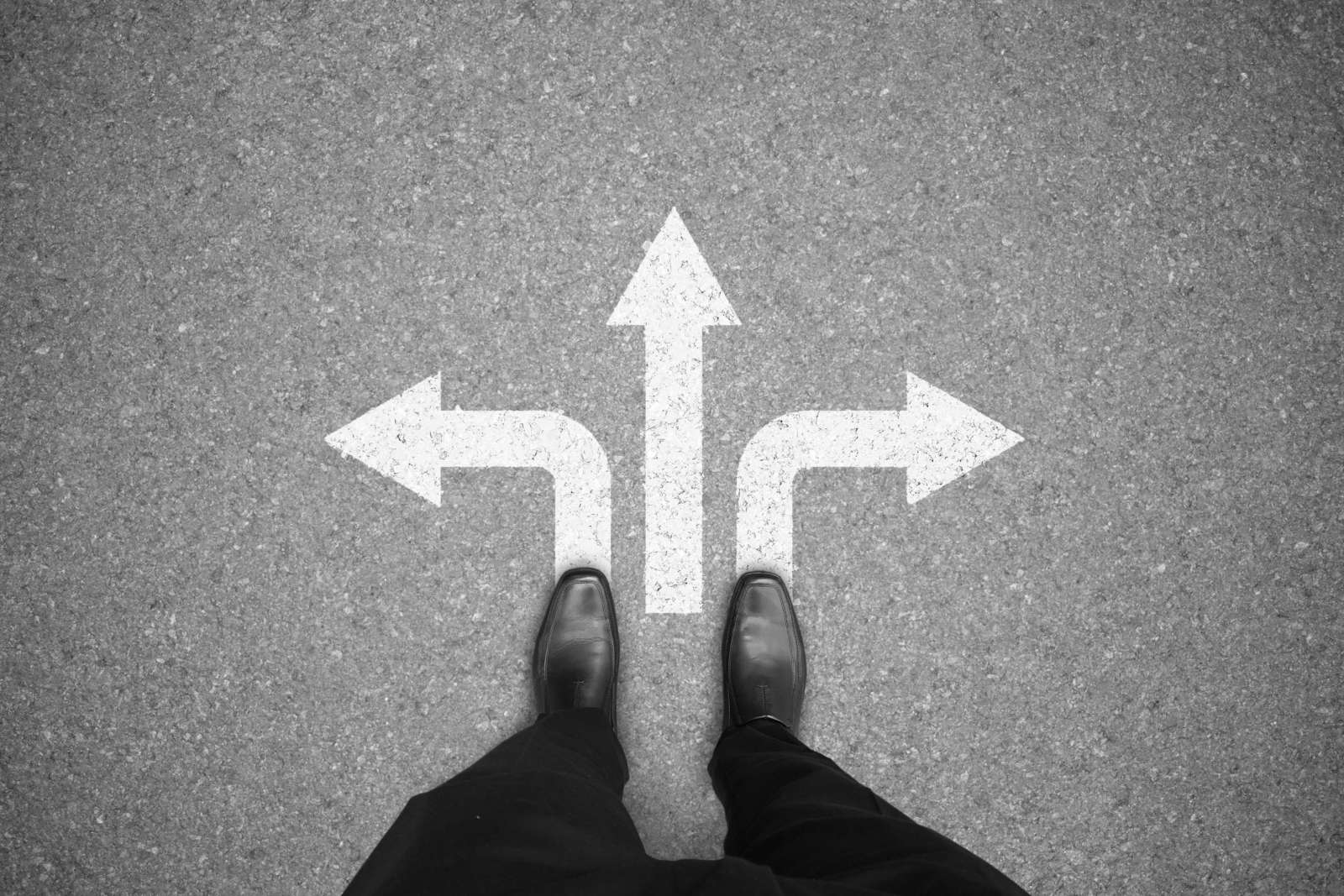Everybody needs love and connection. It has been repeatedly proven to be the biggest defining factor in long-term happiness.
In an 80-year-long study, scientists at Harvard University tracked 268 students as they carried on their journeys—hoping to collect hard data on what really makes a great, satisfying life.
The overwhelming conclusion was that “close relationships, more than money or fame, are what keep people happy throughout their lives…” And they’re also the number one predictor of mental and physical health in old age, even more than genetics.
Yet science has also shown that we’re walking, talking paradoxes.
As vital as relationships are to our wellbeing, our own brains tend to get in the way of allowing them to thrive.
There are built-in aspects of the way our minds function that end up undermining love, and sabotage the sustained experience of intimacy.
Ain’t that a bitch?
It’s like being hungry, and bringing tacos up to your mouth with one hand, then slapping them down with the other.
But if you understand these mental mechanisms, and see them at play, you can start hacking them to work for you, instead of against you.
In this article, we’ll dive into three of the most common, troublesome features of the human operating system that cause us to fall out of love, or plateau, and explore how to use them to fall even deeper back in.
These particularly apply to couples who have passed the honeymoon phase of the relationship (which is, generally, the first 6-12 months).
Because at first, you usually don’t need much help falling head over heels. It’s automatic. The brain has plenty of other programs and chemicals that make you go gaga and want to plunge headfirst into it.
Without an ounce of perceived effort, we eagerly give up most of our time to them—going on dates, hanging out, talking on the phone, texting non-stop, or just thinking about them every second of the day.
Then, as the novelty dissipates over time, we tend to get lazy. And even if we’re still putting some effort into the relationship, it might pale in comparison to how much we once gave in our state of love-drunk obsession.
Once you sense this shift happening, it becomes easy to trick yourself into thinking you’re with the wrong person, or you’re not as happy as you used to be. And intentional work in the connection becomes critical to keep the sparks alive.
Maybe you feel like you’re at risk of falling out of love. Or you know your relationship used to feel like a 10 out of 10, but it’s been gradually sliding lower and lower. Or maybe it’s still amazing, but you just want to dive even deeper, and continue nurturing it.
In any case, you’ll be able to immediately implement the tools below to go deeper in love than ever before.
Here are the three cognitive biases you can exploit to fall more deeply in love:
1. Cognitive dissonance

In psychology, cognitive dissonance means holding two conflicting beliefs or attitudes that cause tension, or second guessing, when you’re faced with an action or situation that triggers those opposing pieces.
And one of those conflicting beliefs or attitudes is often more unconscious than the other.
You might want to make more money, but another hidden part of you is afraid of the responsibility in managing it, or doesn’t believe you can do it, deserve it, or hold on to it.
One part of you might love your partner dearly, yet another might be more passive and just want to live alone in a cabin in the woods.
Most of us can find one part of us that obviously wants to show unconditional love and appreciation to our partner. But there’s also another, more selfish part of us, that’s waiting to be taken care of first, before they can feel willing to give more love and time.
We switch between these different perspectives at different times. It’s almost like we have multiple personalities, or selves, inside of us.
The thing about dissonance is that it creates tension within us.
And we always seek to relieve that tension, whether we know it or not.
We can relieve this tension in one of two ways:
- Changing our actions to match our desired beliefs, or
- Change our beliefs to match our undesirable actions.
The first option is much tougher than the second. If you’re not acting in integrity with how you know you want to be, it takes a lot of effort to start behaving differently, and break old habits to make way for new ones.
Whereas it’s much easier to do nothing, change no behaviours, and just rewrite your mental story to match up with the situation.
So, in the case of wanting to make more money, rather than taking action steps and working to realize your goals, it’s easier to stay the same, and think, “Well, I guess being broke and lazy is just who I am.”
In your relationship, you might start out madly in love with your partner, but don’t do much to demonstrate it in the long run. After a while, you might subconsciously look at your lack of effort and think, “Well, I must not be in love anymore.”
If you want to take option A instead, and move toward growth instead of decline, you can flip cognitive dissonance to work for you by following two steps.
The first is uncovering and confronting that part of you that’s getting in the way.
It might be greedy, lazy, resistant, entitled, or contemptuous. But get honest about that bit of you that just doesn’t want to give love, and only wants to get it. The one that keeps score of who does more chores, or shows more affection.
Before you can move on to the next step, you want to reduce the weight and value this “lower” part of you has. Make a conscious decision whether it’s more important for you to cling on to this resistance, or let it go in service of higher love, and being your best self more often.
If you can honestly say the latter, then you’re more open to follow through with step two…
Identify the “higher” part of you. The one that loves them to bits, and cherishes the relationship. If you need to, close your eyes, picture yourself holding them, and feel the warmth and love in your chest. Or journal about them until you hit that bright state of gratitude.
Once you connect with it, you can begin using cognitive dissonance to your advantage—by “acting as if.”
As I hinted at above, our beliefs and attitudes are feedback loops. Beliefs inform our actions, and our actions inform our beliefs.
So, if you consistently act in a certain way—whether it’s confident, loving, or fitness-conscious—you will start believing that’s who you are. More pieces of your mind get on board with the new direction. And following through consistently becomes easier and more natural.
The same goes for when we act in ways that run counter to our values and goals. We start believe that is who we really are.
So, act as if you love and honour your partner. If you truly did, what would that look like? How would the lover in you behave? What things would you say and do more often, or that you’re not doing now?
It will usually boil down to simply doing more kind things for them. Such as giving more words of affirmation, or doing more kind acts of service than your lazy lower self might otherwise. As you do, your mind will start to feel like you love them more.
Those two suggestions are from the Five Love Languages, by Gary Chapman. You can focus on whichever are the dominant ones for you and your partner:
- Words of affirmation
- Acts of service
- Quality time
- Physical touch
- Receiving gifts
If you haven’t taken a quiz to discover yours, I HIGHLY recommend doing so. You can take an official one on their website for free here. They have one for couples, and one for singles.
It will help you discover what specific things cause both of you to actually feel love—both in receiving and expressing it.
For example, I don’t really care about receiving physical gifts. Others do, and that’s what makes them feel valued. To feel like I’m loved, I know that I need words of affirmation and physical touch. When I speak and hear statements of love and appreciation, it makes we want to melt into a cuddle puddle. Which leads to physical touch, and getting that delicious dump of oxytocin into my bloodstream.
As you start expressing your love more, targeted through your love languages, you just want to keep doing it. Leading with action causes your attitudes to fall in line. You start expressing love more freely, and build a sense of value the relationship—amplifying the belief that you’re deeply in love with the person you’re with.
Because you wouldn’t do all of this nice stuff for someone who you weren’t in love with, right?
2. Negativity bias

Have you noticed that people tend to naturally gravitate toward negative thinking, complaining, worrying, and being anxious about the future?
This is called a negativity bias. And you’ve probably seen it at work in yourself. If you’re familiar with concepts like neuro-plasticity—the idea that the brain wires connections and develops patterns through experience, which can also be rewired—you’ll know that some of our mental and emotional patterns are simply products of habit.
But the negativity bias also has much deeper roots than repetitive reinforcement.
Evolutionary psychologists have explored how a negativity bias is actually an ancient and once-necessary trait of the human mind. It’s a valuable default setting in our operating systems.
Part of the reason why we’ve been able to survive and flourish as a species is because we can anticipate the future, and plan for it. We can worry about whether we have enough food (a scarcity mindset) or when predators are going to invade our homes.
By focusing on what could go wrong all the time, we’re always able to be prepared for worst case scenarios.
Now, that’s a great survival strategy. But in our world today, when water comes out of a tap, food is stocked in grocery stores, and wolves aren’t sneaking into our bedrooms at night to eat our faces off—it’s just an old habit that gets in the way far more often than it serves us.
To override the negativity bias, and see things with a clear head, it takes constant practice. We can swing our mental balance in the other direction by intentionally using gratitude and positive awareness.
In relationship, negativity bias makes our minds way better at scanning for our partners faults, and ruminating on them, than celebrating and highlighting the good stuff.
So, you might regularly meditate on what you love about them, and all of the gifts they bring to your life. Take even one minute each day to stop and think about their great qualities, how they enhance your life, and why you fit together so well.
Since this may not be a habit already, you’ll probably find yourself forgetting to do this. Try setting an alarm on your phone for a random time each day, where you know you won’t be occupied by work calls or other commitments. This might be during your morning routine, at the end of the work day, or before bed. When you’re done, you can keep these thoughts to yourself, or share them with your partner once in a while. Say them aloud, text them, or give them a call.
And if that alarm goes off while you’re with your partner, and they ask what it’s for, you’ll also put a giant, fawning smile on their face. Making them feel appreciation for you, and spreading more positive vibes.
If you can tell that you’re both caught in this pattern of the negativity bias, and you don’t tend to express your mutual appreciation to each other very often, another step would be setting aside a few minutes each week—or as often as you like—to share your loving thoughts.
You could sit down, look each other in the eyes, and share what you love and appreciate about one another. And what you want to acknowledge them for that week. Often there are unsaid “Thank You’s” and appreciation for little things our partner did to help us out, or brighten our day.
Getting these out in the open more often, within your self or between each other, causes the mutual formation of a positivity bias. You begin defaulting to gratitude and love, rather than lack and disconnection. Because you’ve rewritten the autopilot mental script, through intentional practice.
3. Loss aversion
In love, negativity bias is usually trying to serve a deeper purpose.
One reason why we tend to constantly look for their flaws, or answers for why the relationship won’t work, is because we’re trying to plan ahead and avoid painful experiences.
We want to avoid the hurt of losing someone, or being left by them. Many people dwell on this fear endlessly, and do so much out of anxiety to prevent it from happening.
In general, we also tend to be more motivated by protecting what we could lose, over what we might gain. Some studies have shown that losses are twice as psychologically powerful as wins.
So, if most people lost $100, the amount of negative feelings they’d experience would greatly outweigh the amount of positive feelings resulting from winning $100. And they would go to much greater lengths to save $100 than they would to make it.
Ok. Cool, Jordan. But how does this help my relationship?
Well, what’s the takeaway here? By instinct, we’re massively motivated to avoid losses. We move into action to protect what we perceive as valuable. Once you grasp this drive, you can exploit it and apply it to your partner, and leverage the primal fear of loss to deepen your love.
Once we’ve settled into a relationship, it’s sadly the norm to begin taking it for granted. It feels like we can take our hands off the steering wheel, and it will just drive itself. We’ve secured the connection, maybe even got hitched, and we feel like the work is done.
After the obsessive rush wears off, we tend to become more focused on the rest of our lives. Our careers and finances, parenting and hobbies. And the relationship fades a little more into the background. It seems like it will always be there, no matter what.
This slowly creeping apathy is one of the most common causes of loveless marriages, if it doesn’t kill them altogether.
Rather than letting yourself drift to that place, you can consciously steer yourself back into love. Making that turn involves getting more in touch with the fact that your lover isn’t permanent.
Not only is it possible that you could lose them—it’s an inevitable fact. If it doesn’t happen before then, you will lose them when either of you die.
The principle behind this is just like the classic meditation on your own death. By acknowledging the fact that you’re going to die, remembering that everything is temporary, and getting present to how little time you have left, you create more gratitude and urgency for being alive.
You don’t need to wait for a near-death experience (or a near-divorce experience) to wake up to the beauty of life, and your love. Or finally express all the things you’ve left undone, and unsaid. You can take yourself to that place in your mind on purpose.
Regularly imagine your partner being with someone else. Think about what it would be like to lose them. Either by them leaving you, or them dying before you.
In doing this around your partner, it creates that same sense of presence to the preciousness of your connection, and how they massively impact your life—in all the ways you’ve forgotten about.
And since they still exist with you today, and they’re still choosing to be with you, you have the opportunity to do things that show you honour and appreciate them.
You might be inspired to start saying “I love you” more often, or be less stingy with your touch, or simply making time to connect.
You might plan the dates and trips you’ve been putting off for months, or years, because you’ve been so busy and figured you’d get around to it someday.
The Bottom Line
The fact that you’re even reading this is already an action step in all three of these areas.
You’re thinking about being more in love, and ways you can show more love to your partner.
You’re awakening to the fact that you’ve got something really good. You already know you’re with someone who deserves love and happiness, and that you do too. Otherwise, you wouldn’t be here.
So, I’ll leave you with this:
Love starts working when you do.
Everything we just talked about comes down to taking little actions. Whether you’re going to start giving more kindness, or scheduling time to reflect in gratitude, or contemplating life without your partner.
The end result is you showing up more. Giving more. Loving more. And though that becomes easier when you radically connect with the value in your relationship, it still won’t always happen on its own.
You’re swimming against a mental current that’s been running all your life, and for millions of years before that. There may be times when you just don’t feel like paddling. Or you’re stressed out by the minutia of life. But you still make the effort.
Because you’re investing in a priority. And it’s an investment that pays far more massive returns than any stock or cryptocurrency.
As Harvard showed us at the start of this read, these dividends are the kind that make life truly worth living.
Dedicated to your success,
Jordan







